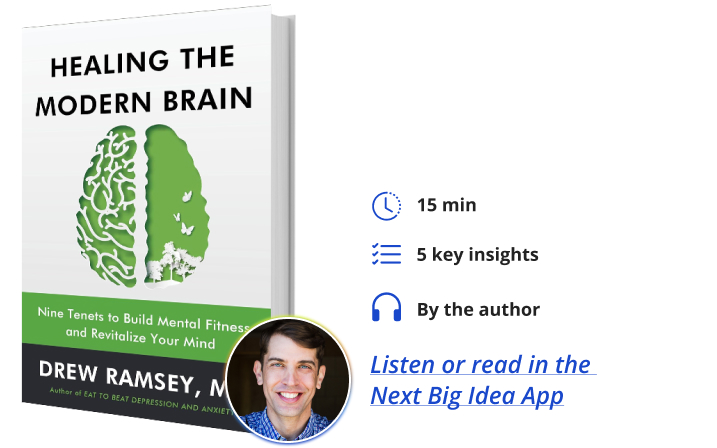Dr. Drew Ramsey is a board-certified psychiatrist and psychotherapist. He is a leading voice in nutritional psychiatry and integrative mental health. He is a Fellow of the American Psychiatric Association and the founder of the Brain Food Clinic and Spruce Mental Health. For twenty years, he was an assistant clinical professor of psychiatry at Columbia University. His book Eat to Beat Depression and Anxiety was an international bestseller, and his work has been featured by the New York Times, The Wall Street Journal, The Today Show, NPR, and other outlets.
What’s the big idea?
The time to start working on positive mental health outcomes should not be when a mental health crisis begins. In a country that has an epidemic of loneliness and rising depression, anxiety, and suicide rates, our society can’t afford to put off healthy brain habits until they are part of a treatment plan. Modern ways of life don’t naturally promote a happy, healthy mind, so it’s important to take initiative and proactively nurture your own brain health every day.
Below, Drew shares five key insights from his new book, Healing the Modern Brain: Nine Tenets to Build Mental Fitness and Revitalize Your Mind. Listen to the audio version—read by Drew himself—in the Next Big Idea App.

1. Seeing mental health as mental fitness.
Mental fitness is the habits, knowledge, and patterns that support overall mental health and sound wellbeing. Shifting from a mental health stance to one of mental fitness is key to healing the modern brain.
Our mental health epidemic is rife with concerning statistics. The rate of teenage depression has increased from eight percent to twenty percent. There is a rise in suicide and overdose. Sixty-one million Americans are diagnosed with depression and anxiety alone.
Getting into a stance of mental fitness asks us to think about mental health differently. Instead of waiting and hoping to never see someone like me—waiting until you have a mental health crisis to address—mental fitness asks us to be proactive. The human brain requires some basics regarding care and feeding, and the modern world is taking a toll on those things. Being active is great for mental health, but 80 percent of jobs are now sedentary. Quality sleep is absolutely essential for mental health.
Shifting into a mental fitness stance asks us to be preventative about the tenets of a healthy brain. Mental fitness is different from many other programs and ideas because these tenets are very simple. If you look at heavily evidence-backed, agreed-upon healthy practices, you’ll find things like spending more time in nature. Grounding is one of the tenets, and, in a stance of mental fitness, you try your best to get more nature in your life, from week to week. Many great studies show that getting into nature, for even a little bit, improves and activates the immune system in wonderful ways. Research confirms that nature shifts our brains and calms us down. Change your stance into one of mental fitness by striving to build brain-healthy habits before problems arise.
2. Upgrades to brain science.
The latest science in mental and brain health is really hopeful. One major new concept is neuroplasticity, the idea that the brain grows and repairs itself into adult life. I finished medical school in the year 2000. We didn’t know about neuroplasticity, but now it is coming to light that there is a molecule that your genes code for called BDNF (brain-derived neurotrophic factor), and certain activities and foods help you make more BDNF. It’s like a brain growth agent. When our brain weakens or declines, it’s not necessarily permanent. We can turn on and off genes that promote brain growth and repair. We may not have complete control, but we can do much in our everyday choices to improve brain health.
“Inflammation is now understood to be at the heart of some depression and anxiety cases.”
Another part of upgrading brain science is thinking about inflammation in relation to the brain. Inflammation is a buzzword in science. It is part of our body’s natural and important protection and alarm systems. It is how we defend ourselves from viruses, bacteria, and all sorts of invaders. Inflammation is now understood to be at the heart of some depression and anxiety cases. It’s important to start thinking about modern mental health in modern ways.
The last major upgrade to brain science is about the microbiome. Many people never thought that the organisms living in your colon relate to mental health. As it turns out, the gut is the biggest part of our immune system. Eating more plants and fermented foods shifts your microbiome into a healthier state that regulates inflammation. Never before in my career has there been so much great science to support recommending fermented foods to my patients.
3. The first tenet of mental fitness is self-awareness.
I start the nine tenets with self-awareness. In the book, I tell the story of a woman who started drinking a little more during the pandemic. I worked with her and came to appreciate her self-awareness. She started counting drinks, checking in with me about alcohol, and thinking more about the risks of alcohol in her life. That put her on the path to getting control of her drinking.
Self-awareness allows you to better understand how your activities shape the self. It doesn’t have to be therapy. I’m a big fan of journaling. By writing down thoughts and feelings, putting labels on what we’re experiencing, research has shown an associated increase in frontal lobe activity. These parts of our brain are involved in executive functioning, decision making, and getting stuff done. There is brain health value to taking more time and a little more effort to focus on the self. Getting to know and care for yourself in new and different ways is at the heart of healing the modern brain.
4. Feeding mental health.
Mental fitness as a concept really hit home for me through my work in nutritional psychiatry. When I was a young doctor training as a psychiatrist at Columbia, it was striking to me as a farm boy that we didn’t talk at all about nutrition. We weren’t trained or encouraged to ask patients what they were eating, but it seemed like a big opportunity. If you have depression and eat a vegetarian diet versus a keto diet versus junk food diet, all of those dietary patterns impact treatment and provide different opportunities. The SMILES Trial of 2017 showed that when individuals who were in mental health treatments for depression were counseled on a Mediterranean diet, they saved a lot of money and their depression got a lot better. A third of them went into complete remission from their clinical depression. This study is an example of an augmentation strategy with foods, meaning a Mediterranean diet is added on top of treatment.
“There is brain health value to taking more time and a little more effort to focus on the self.”
Feeding mental health well is a daily opportunity for everyone, not only patients. It can feel overwhelming. There is a lot of fearmongering and misinformation about nutrition; my work helps you cut through the noise to simple things like lentils, pesto, wild salmon, anchovies, and white beans. Those are some of the most nutrient dense foods on the planet, meaning they have more nutrients per calorie than other foods, and they also have specific nutrients that we know the brain needs—an easy place to get started.
5. Boosting mental fitness.
In my time with patients during classic 45-minute sessions, I see how important connections are. The recent Surgeon General, Vivek Murthy, noted that we have an epidemic of loneliness and isolation in America. We increasingly see people losing friends, spending less time socializing, and less time going out. Young folks, especially, are growing more isolated. This awareness needs to be turned into action.
In my chapter about connection, I share the story of a middle-aged man I worked with who was post-divorce. He was very connected to his kids, so it was hard for him when they left for college. He enjoyed fantasy football, but was struggling to connect with the real-life elements surrounding the sport. Helping him engage with other fans and attend games in person was a significant part of his healing.
A web of connections is not just friends and loved ones. It is important to map out all our different types of connections. It’s not just the ride-or-die folks in your life: connections to institutions, mentors, mentees, or to meaningful places matter too. This process (great journal entry) can help a person feel connected to themselves and see pathways that can expand their life. You could end up going to the farmer’s market regularly to connect more with the people who grow your food, or attend a town hall meeting to feel part of your community. The best time to start caring for your brain is before something goes wrong.
To listen to the audio version read by author Drew Ramsey, download the Next Big Idea App today:
































